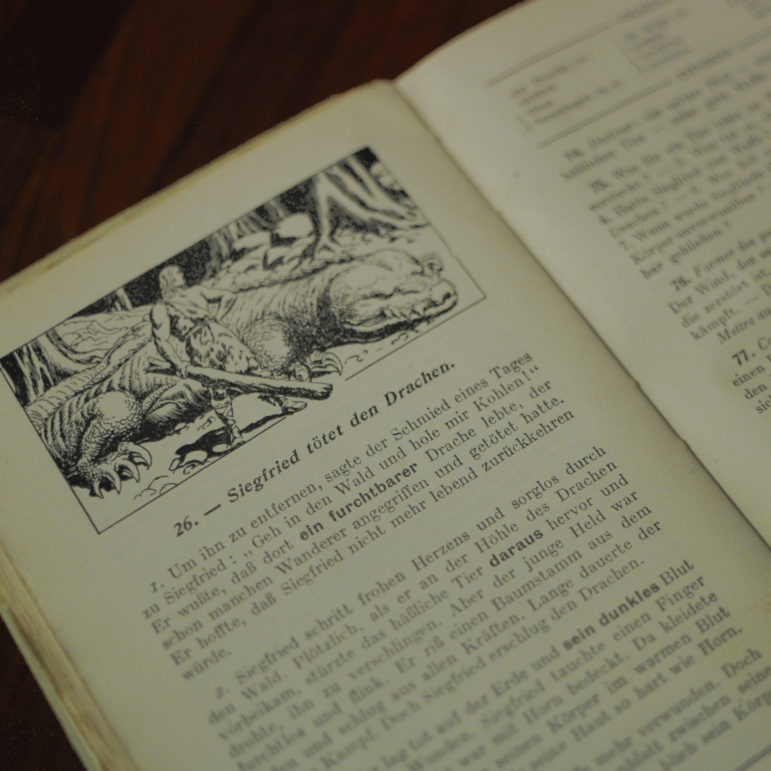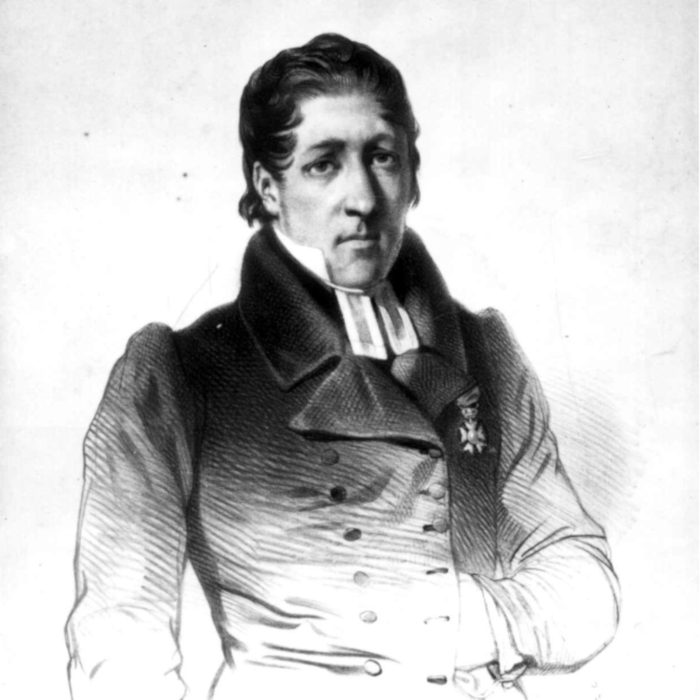
As I write these lines, it is still early morning on the second of January 2020. The sun is nowhere to be seen and will not grace the skies of my Arctic hometown of Tromsø until the end of the polar night in about three weeks. Yesterday was the start of a new year, but more importantly, that of a new decade. While many look forward to such landmarks, many of us Pagans always keep an eye on the other side of the wheel. After all, every innovation is based, at least partly, on some older foundations, which in turn can be brought back, and bring forth change on their own.
Many will tell you that taking the past into the present, turning it into future, bringing the dead back to life, and giving them a seat at the table is a quintessential Pagan act. This, it could be argued, is what we do, and what I plan on doing for a little while at least. I will be bringing the language of my family that had seemingly died with me, back from the dead.
Not everyone knows that, but despite being born, bred, and raised in France, my ancestry is, not unlike that of many folks from North America, quite all over the place. From various family records I have seen, my family tree is mostly populated by French, Spanish, Italian, and Swiss ancestors, alongside a very large number of Germans.
Growing up, I certainly knew that, from my mother’s side, pretty much everyone was from this fascinating land that lies east of the Rhine. When they spoke with each other, they almost always did so in German. I, for myself, did not, because my mother decided to solely raise me in French. It made sense, all things considered. I was, after all, born and living in France. Plus, absolutely everyone in my family was perfectly bilingual with French (and trilingual with English), a tradition at least as old as my once great grandmother Mutti who managed to put her linguistic skills to use at the close of WWII.
Growing up, I did not think all that much about the fact that I was essentially half German, and yet could not speak the language. To be fair, I did give it a go, but even in seven years of public schooling, I was not able to develop my German language skills beyond a mere stuttering of half-baked phrases and odd, guttural sounds.
Fast forward a couple of years, and this once linguistically challenged person somehow managed to exile himself to the cold shores of Scandinavia and learn English, as well as Swedish-Norwegian. This was when I began to think more seriously about Paganism, heritage, and what it meant to reconnect with one’s history, ancestors, and homeland.
When I still lived in France, some two decades ago now, my attention was mostly drawn towards Celtic myth (something which I unfortunately never dug that much into), and the Greco-Roman world. I still recall the Latin classes I took, the visits to ruined Roman villas, and reading books such as Ovid’s Metamorphoses, the Iliad, and the Odyssey. This might only have been part of my heritage, but back then, it made sense to follow a path that had already been thread on, in the same place, millennia ago.
When I fared north into Scandinavia, my focus quite obviously changed. Far from the warm shores of the Mediterranean, new gods and traditions existed there, and I soon began to actively research Old Norse myth and culture, a process that culminated in moving to Iceland to undertake a degree in this field. There, I learned about the genesis of what we now call “Old Norse Religion,” and its murky prehistory in the days of Arminius’ Germania. But while there was so much to learn about the Old Religion when stepping away from the good old Eddas, another problem arose: German.

Lyonel Perabo
The story of Sigurd the dragon slayer, translated into modern German [L. Perabo]
If nowadays most of the scientific literature published is written in English, it has certainly not always been so. Especially in the olden days of the 18th and 19th centuries, countless books, articles, monographs and other works were published in the various languages spoken in Europe. And, as the National-Romantic movement flourished on the continent, so did studies in what was back then termed “the antiquities.” Up until the second World War, a number of highly influential works about the Old Norse world, religion, and mythology were published in German, and to this day, almost all of these remain untranslated. For an aspiring Academic Heathen such as me, my lack of German skills started showing.
As I began writing my thesis, I quickly realized how important the German language would be if I were to seriously engage with modern scholarship. From Jan DeVries’ near-legendary Altgermanische Religionsgeschichte, said to be the most comprehensive, and sturdiest monograph on Old Norse Religion ever written, to the brothers Grimm’s studies of fairy tales and myths, and the monumental Kommentar zu den Liedern der Edda project, there simply was no way I could keep turning a blind eye to this towering language. At some point, sooner or later, I would have to actually commit to learning it.
I will have to learn what could easily have been my mother tongue. It is a bit of a puzzling feeling, but I am far from the only one in this situation. Here where I live in Northern Scandinavia, many have had to go through a very similar process, and in a much more traumatic context. Speakers of languages such as Sámi and Kven (a northern branch of Finnish) were historically repressed and systematically discriminated against for no other reason than belonging to an ethnic minority and speaking the language of their ancestors. And while such policies are, for the most part, confined to history books and the memory of elders, many still feel a sense of loss of having been deprived of their language, and the culture it comes with.
I remember, how, a few years ago, a local Sámi woman from the small village of Kautokeino put it together. We were just casually discussing our respective backgrounds, and, upon hearing that I was not fully committed to the idea of teaching my own mother tongue, French, to a potential child of mine, she immediately advised me to reconsider. I was told how she herself came from a family where she had not been taught her ancestral language, and how she felt she had been handicapped by having to reclaim something she ought to have inherited.

Émile Lasalle (1811-1871)
Lars Levi Læstadius, by the French artist Émile Lasalle (1811-1861) [digitaltmuseum.no, public domain]
As I listened to her story, it dawned on me that besides being a mere medium of communication, languages can mean much more to the people speaking them. From concepts and ideas that cannot be accurately translated to the aesthetic qualities of the sound of spoken words, a language can elicit feelings, alter entire states of mind, and even bring forth strong feelings of spiritual devotion. One remarkable example of the spiritual power of languages is that of Lars Levi Læstadius.
Læstadius, a half-Sámi preacher who originated and ministered in Swedish Lapland in the 19th century, was noted for his radical pietistic views, which profoundly influenced and transformed the spiritual and even daily lives of the Sámis and Finns of Northern Fennoscandinavia. In his lifetime, he was an ardent promoter of Christianity, a faith that was then relatively new in the region. Yet, his command of no less than five languages and his advocacy of the use of Sámi and Finnish helped increase literacy rates and strengthened languages that were being actively suppressed.
Not only did his use of Sámi, which he called “the language of the heart,” have a positive effect on Sámi culture in the long term, but his knowledge of the language also made it possible for him to gather and transmit much knowledge about the Sámi’s old religion.
To this day, he is still a much-revered figure, and even some modern Sámi shamans express a degree of respect for his movement and what he accomplished. Læstadius might not have recognized it as such, but he certainly wove magic through his words, and through his use of language. He demonstrated the power knowing and learning a language holds, a power that could very well manifest itself in a Pagan context just as much as a Christian one. I myself might never start a revival of pietist German-speaking Paganism, but who knows how life could change in the weeks and months to come?
As I finish these lines, night has long fallen over my Arctic hometown of Tromsø. Next to me lies a couple of beaten old German books. There might not be anything spiritual, or magical about them, but these will have to do. There are still three hundred and sixty-two days left in the year, and an oath is an oath. I might not know what tomorrow will be made of, but I know one thing for certain. Next year, when I talk to my grandmother, my grandfather, my great grandmother and the rest of the family’s departed, I will speak to them in German. Because if there is such a thing as a language of the heart, mine is surely German.
The Wild Hunt always welcomes submissions for our weekend section. Please send queries or completed pieces to eric@wildhunt.org.
The views and opinions expressed by our diverse panel of columnists and guest writers represent the many diverging perspectives held within the global Pagan, Heathen and polytheist communities, but do not necessarily reflect the views of The Wild Hunt Inc. or its management.
The Wild Hunt is not responsible for links to external content.
To join a conversation on this post:
Visit our The Wild Hunt subreddit! Point your favorite browser to https://www.reddit.com/r/The_Wild_Hunt_News/, then click “JOIN”. Make sure to click the bell, too, to be notified of new articles posted to our subreddit.